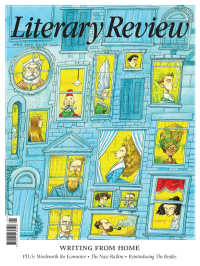Philip Womack
Fantastic Beasts & How to Slay Them
Nightshade
By Anthony Horowitz
Walker Books 439pp £12.99
The return, with a bang and a half, of Anthony Horowitz’s teenage spy, Alex Rider, in Nightshade is a splendidly welcome event. Reluctantly thrust into the life of an international sleuth by his uncle, Rider has really been through the mill over the years. All he wants to do is take his GCSEs and get on with having a normal life. There are forces, however, that don’t want him to rest.
Teenagers will find this instalment as inventive, involving and gripping as any of its predecessors. There’s a dastardly new organisation in town called Nightshade, which doesn’t act out of any ideological motives, but rather financial ones. Their latest plot: to bomb St Paul’s Cathedral in London. Their methods are chilling: they kidnap children and train them up to be killing machines.
The similarities with Rider’s own situation are obvious, and there are many moments when he feels a twinge of sympathy for his opponents, who are forced to learn martial arts when they should be drinking milkshakes in the local fast-food joint. Rider is dispatched to a maximum security prison disguised as the criminal Julius Grief – who has undergone plastic surgery to appear exactly like Alex Rider. Is this a convenient plot point or a clever way to explore notions of the self? Doppelgängers are eerie and this aspect of the story gives Nightshade a troubling quality. I hoovered it down in a day. Many headmasters have warned children against the Alex Rider novels. I say, read them all.
Crater Lake
By Jennifer Killick
Firefly 242pp £6.99
More children in impossibly dangerous situations are to be found in Jennifer Killick’s quirkily original Crater Lake. A school bus is en route to Crater Lake, a Center Parcs-style resort in the middle of Sussex, built in the middle of an asteroid crater. Science fiction aficionados will realise that such a location is probably not the best place to build anything at all, and almost immediately disturbing things happen.
Crater Lake is a riff on Invasion of the Body Snatchers, as the children and staff begin to be taken over by mysterious entities and are set to work on digging up the lake bed in search of alien spores. ‘They’re not harmful, are they? Just aesthetically peculiar and focused on some job they have to do,’ says one of the characters about their possessed school friends, whose eyes have taken on a metallic gleam. In fact, they are dangerous, and soon our witty protagonist, Lance, and his ragtag band of friends have to stay awake all night in order to avoid being transformed into aliens and put a stop to them while they’re at it. A darkly hilarious treat for those of eleven plus.
The Highland Falcon Thief
By M G Leonard
Macmillan 238pp £6.99
M G Leonard, the author of the highly successful Beetle Boy series, in which a boy becomes friends with a giant beetle, has teamed up with Sam Sedgman to produce The Highland Falcon Thief, the first in a projected series set on trains for children of nine and up. Trains have a special place in children’s literature: the Hogwarts Express, steaming off into magical worlds; Alice jumping on a train to reach another chess square in Looking-Glass land; Bobbie and Phyllis flagging down the train with their red petticoats in The Railway Children. Dangerous, enclosed spaces, trains also offer the promise of adventure. They are equally terrifying and awesome.
Hal is packed off with his travel journalist uncle for a trip on the titular train while his mother gives birth. Nobody’s asked him if he wants a baby sibling; he’s feeling neglected. The train is on its final journey and is stuffed with royals and aristocrats. Lydia Pickles’s priceless brooch goes missing and Hal helps uncover the thief. The puzzles are clever, the tone light and the story easy to follow.
Monster Slayer
By Brian Patten
Barrington Stoke 51pp £6.99
For what is arguably our national poem, Beowulf is neglected in children’s studies; I don’t think I encountered it until I was seventeen or so, when Seamus Heaney’s translation came out. The publication of a child-friendly version is thus most pleasing, and Brian Patten, in Monster Slayer, has produced a well-paced, accessible story full of vivid, memorable images: ‘All this happened in distant times, when wild boars roamed the countryside, and moon-mad wolves slunk past in the night.’ Grendel is a terrifying creation, skulking in his cave – ‘Sweet human meat’s the best to eat,/And human bones the best to grind/Human blood will flow again/And terror haunt the human mind’ – and his mother even more so. Beowulf is a classic hero, brave and cunning at the same time. The lively, imaginative illustrations by Chris Riddell (longtime illustrator for Literary Review, among many other things) will be a boon for younger readers. Hwaet!

Sign Up to our newsletter
Receive free articles, highlights from the archive, news, details of prizes, and much more.@Lit_Review
Follow Literary Review on Twitter
Twitter Feed
The son of a notorious con man, John le Carré turned deception into an art form. Does his archive unmask the author or merely prove how well he learned to disappear?
John Phipps explores.
John Phipps - Approach & Seduction
John Phipps: Approach & Seduction - John le Carré: Tradecraft; Tradecraft: Writers on John le Carré by Federico Varese (ed)
literaryreview.co.uk
Few writers have been so eagerly mythologised as Katherine Mansfield. The short, brilliant life, the doomed love affairs, the sickly genius have together blurred the woman behind the work.
Sophie Oliver looks to Mansfield's stories for answers.
Sophie Oliver - Restless Soul
Sophie Oliver: Restless Soul - Katherine Mansfield: A Hidden Life by Gerri Kimber
literaryreview.co.uk
Literary Review is seeking an editorial intern.